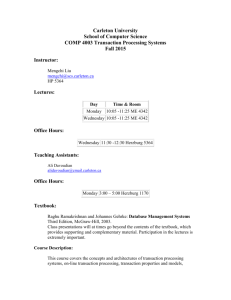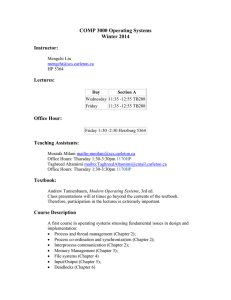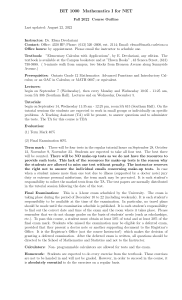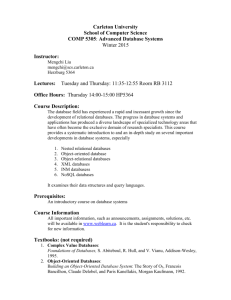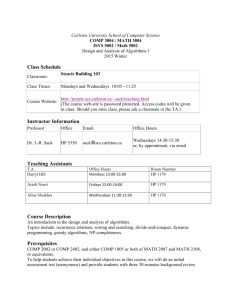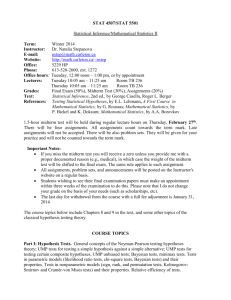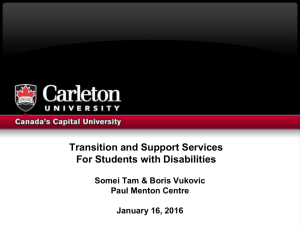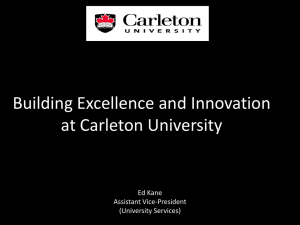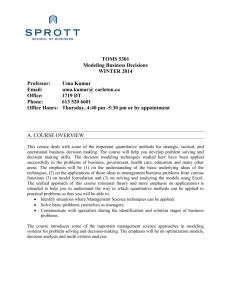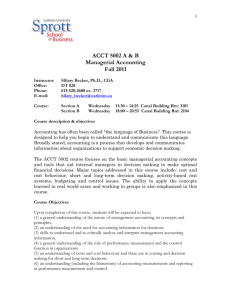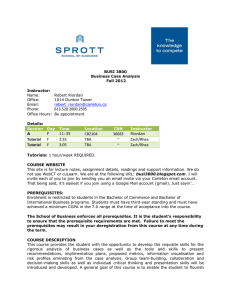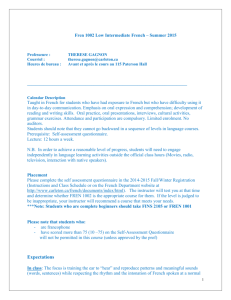cuLearn
advertisement
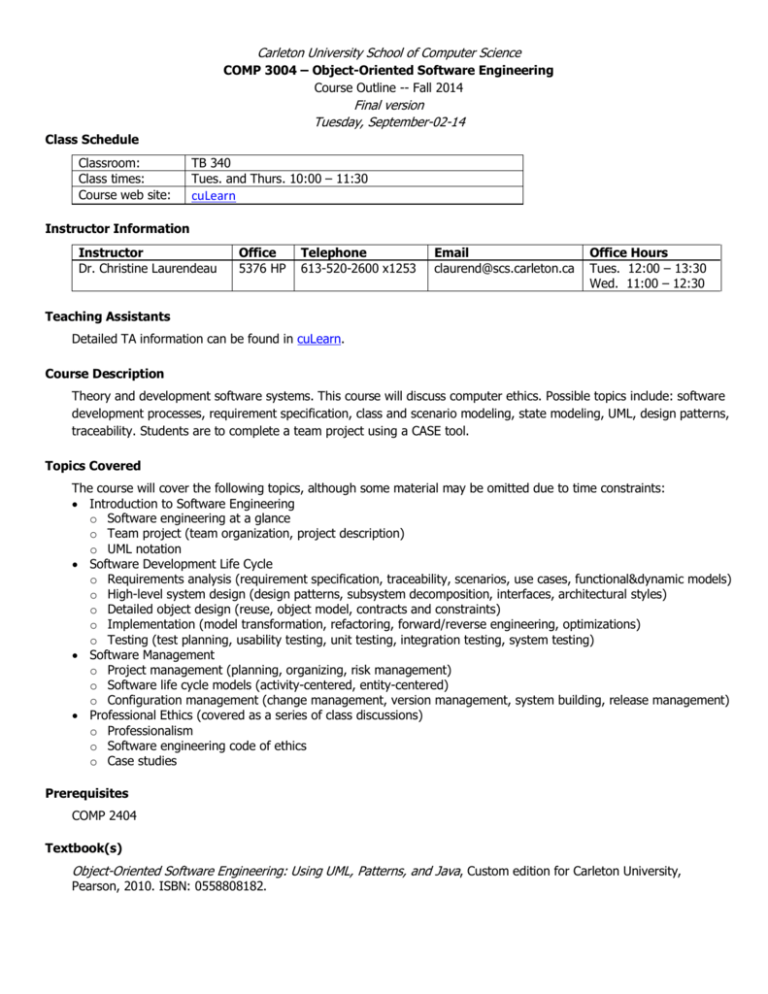
Carleton University School of Computer Science COMP 3004 – Object-Oriented Software Engineering Course Outline -- Fall 2014 Final version Tuesday, September-02-14 Class Schedule Classroom: Class times: Course web site: TB 340 Tues. and Thurs. 10:00 – 11:30 cuLearn Instructor Information Instructor Dr. Christine Laurendeau Office 5376 HP Telephone 613-520-2600 x1253 Email claurend@scs.carleton.ca Office Hours Tues. 12:00 – 13:30 Wed. 11:00 – 12:30 Teaching Assistants Detailed TA information can be found in cuLearn. Course Description Theory and development software systems. This course will discuss computer ethics. Possible topics include: software development processes, requirement specification, class and scenario modeling, state modeling, UML, design patterns, traceability. Students are to complete a team project using a CASE tool. Topics Covered The course will cover the following topics, although some material may be omitted due to time constraints: • Introduction to Software Engineering o Software engineering at a glance o Team project (team organization, project description) o UML notation • Software Development Life Cycle o Requirements analysis (requirement specification, traceability, scenarios, use cases, functional&dynamic models) o High-level system design (design patterns, subsystem decomposition, interfaces, architectural styles) o Detailed object design (reuse, object model, contracts and constraints) o Implementation (model transformation, refactoring, forward/reverse engineering, optimizations) o Testing (test planning, usability testing, unit testing, integration testing, system testing) • Software Management o Project management (planning, organizing, risk management) o Software life cycle models (activity-centered, entity-centered) o Configuration management (change management, version management, system building, release management) • Professional Ethics (covered as a series of class discussions) o Professionalism o Software engineering code of ethics o Case studies Prerequisites COMP 2404 Textbook(s) Object-Oriented Software Engineering: Using UML, Patterns, and Java, Custom edition for Carleton University, Pearson, 2010. ISBN: 0558808182. Evaluation Students will be evaluated in this course according to the following measures: Component Weight Due Date Project Phase #1 25 % Oct. 16, Nov. 6 Project Phase #2 25 % Nov. 25, Dec. 8 Midterm Exam 15 % Tues. Oct. 21 Final exam 35 % TBA Evaluation Note This course involves four (4) project deliverables, organized into two phases. In order to pass the course, students must obtain a passing grade for each phase, and a passing grade on the exam component of the course. Every team member is expected to contribute equally to each deliverable, and individual marks will be adjusted for each student based on his/her contribution. Important Dates Design reviews of Phase #1 will take place in class on Nov. 11 and Nov. 13. Each team is required to present their design at that time. Demo Day will be on Dec. 9, and every team will demonstrate their working prototype on that day. Attendance Course notes will be made available, but these will only contain the outlines for the lectures. The midterm and final exams will cover all the material presented during the lectures and in the class discussions. Students are expected to attend all lectures in order to pass the course. Collaboration Policy Collaboration on the project is restricted to members of the same team, which will consist of no more than four (4) students. Inter-team collaboration is strictly disallowed. While the instructor may be of some assistance in the formation of teams, it is ultimately the responsibility of each student to either create a team or find an existing one to join. The instructor retains the exclusive right to dissolve teams and/or reorganize team membership at her discretion, where doing so best suits the academic objectives of the course. Undergraduate Academic Advisor The Undergraduate Advisor for the School of Computer Science is available in Room 5302C HP, by telephone at 5202600, ext. 4364 or by email at undergraduate_advisor@scs.carleton.ca. The undergraduate advisor can assist with information about prerequisites and preclusions, course substitutions/equivalencies, understanding your academic audit and the remaining requirements for graduation. The undergraduate advisor will also refer students to appropriate resources such as the Science Student Success Centre, Learning Support Services and the Writing Tutorial Services. University Policies Student Academic Integrity Policy Every student should be familiar with the Carleton University student academic integrity policy. A student found in violation of academic integrity standards may be awarded penalties which range from a reprimand to receiving a grade of F in the course or even being expelled from the program or University. Some examples of offences are: plagiarism and unauthorized co-operation or collaboration. Information on this policy may be found in the Undergraduate Calendar. Plagiarism As defined by Senate, "plagiarism is presenting, whether intentional or not, the ideas, expression of ideas or work of others as one's own". Such reported offences will be reviewed by the office of the Dean of Science. Unauthorized Co-operation or Collaboration Senate policy states that "to ensure fairness and equity in assessment of term work, students shall not co-operate or collaborate in the completion of an academic assignment, in whole or in part, when the instructor has indicated that the assignment is to be completed on an individual basis". Please refer to the course outline statement or the instructor concerning this issue. Academic Accommodations for Students with Disabilities The Paul Menton Centre for Students with Disabilities (PMC) provides services to students with Learning Disabilities (LD), psychiatric/mental health disabilities, Attention Deficit Hyperactivity Disorder (ADHD), Autism Spectrum Disorders (ASD), chronic medical conditions, and impairments in mobility, hearing, and vision. If you have a disability requiring academic accommodations in this course, please contact PMC at 613-520-6608 or pmc@carleton.ca for a formal evaluation. If you are already registered with the PMC, contact your PMC coordinator to send me your Letter of Accommodation at the beginning of the term, and no later than two weeks before the first in-class scheduled test or exam requiring accommodation (if applicable). After requesting accommodation from PMC, meet with me to ensure accommodation arrangements are made. Please consult the PMC website for the deadline to request accommodations for the formally-scheduled exam (if applicable) at http://www2.carleton.ca/pmc/new-and-current-students/datesand-deadlines/ Religious Obligation Write to the instructor with any requests for academic accommodation during the first two weeks of class, or as soon as possible after the need for accommodation is known to exist. For more details visit the Equity Services website: http://www2.carleton.ca/equity/ Pregnancy Obligation Write to the instructor with any requests for academic accommodation during the first two weeks of class, or as soon as possible after the need for accommodation is known to exist. For more details visit the Equity Services website: http://www2.carleton.ca/equity/ Medical Certificate The following is a link to the official medical certificate accepted by Carleton University for the deferral of final examinations or assignments in undergraduate courses. To access the form, please go to http://www.carleton.ca/registrar/forms
